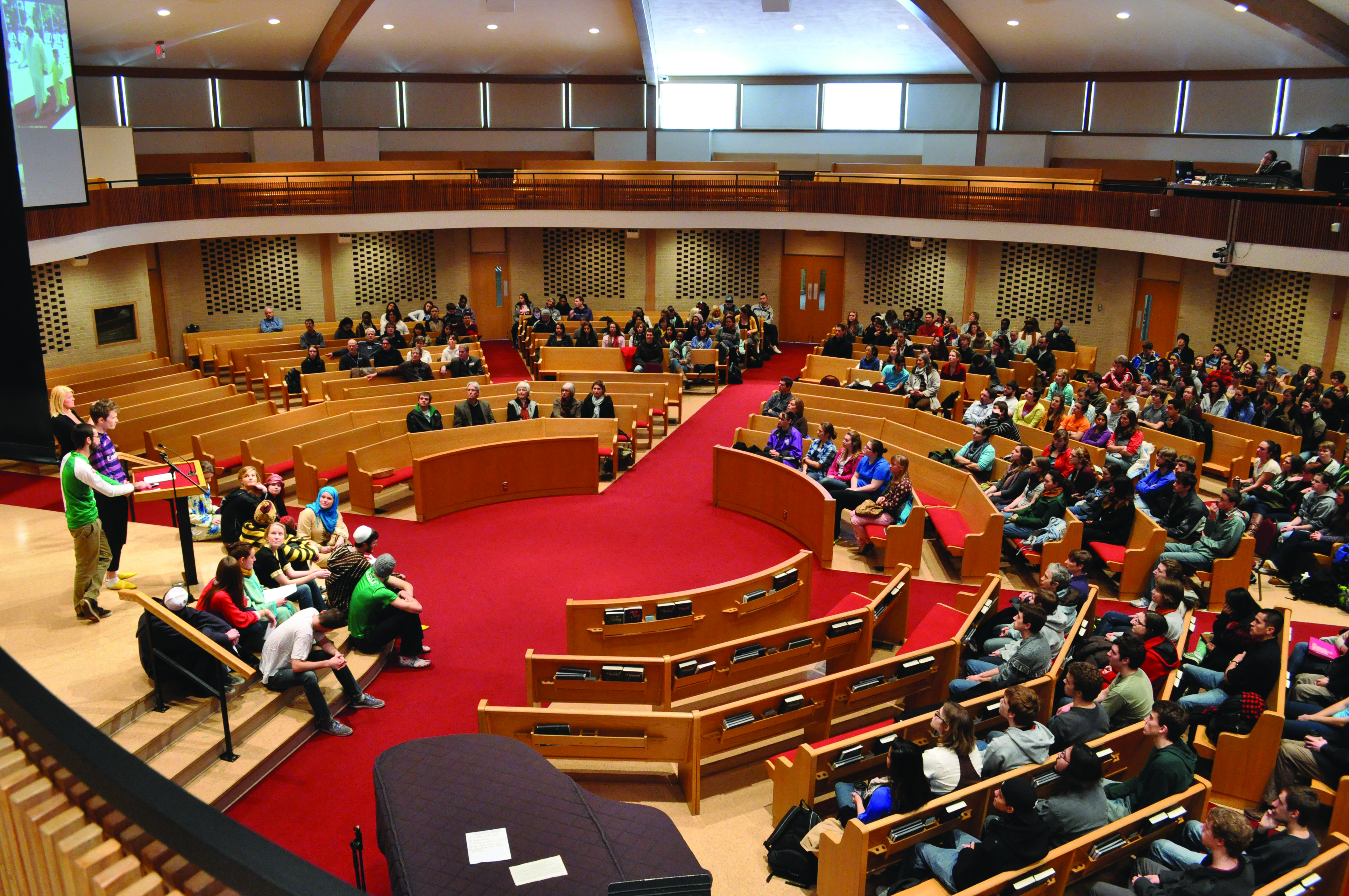Aaron Stiffney is no stranger to idea of the “swipe and run.”
“I went to chapel, and in my head I was thinking ‘I’m going to swipe and run,’” confessed Stiffney, a sophomore. “Then I met up with my friends and they said I couldn’t do it. I didn’t want to get caught because I’d probably lose my swipe.”This seems to be an increasingly familiar scenario for Goshen College students faced with the attendance requirement for convocation and chapel. Some students–though certainly not all–are tempted to swipe their ID for credit and then leave.
Although unknown to many students, convocation and chapel are run by two separate departments. Becky Horst, an academic administrator, supervises the planning of Monday convocations, while Campus Ministries plans Friday chapels. Bob Yoder and Gwen Gustafson-Zook, campus pastors, oversee chapel planning along with student committee members Ashika Thanju, Becky Snider and Natasha Weisenbeck.
Convocation is technically the only required event, but students may also receive credit for chapel. Yoder wants to clarify the distinction between the two. “Their focus and their intent are different,” Yoder said. “It would be really helpful if we all in the community would recognize the difference and make choices about which we want to attend based on what we’re looking for.”
The intention of convocation is to provide integrative learning opportunities, explore complex problems, ask big questions and celebrate learning. Chapel, however, is intended to be a Christian worship experience that tends to the spiritual formation of the gathered community.
Goshen College changed chapel requirements during the late 1960s, adding convocation because they did not want to force people to attend worship services, especially if they came from different faith backgrounds. Currently students must attend roughly half of the events offered each semester.
Goshen’s attendance policy differs from other Mennonite colleges. While Eastern Mennonite University and Bluffton College have no requirement, Hesston requires 24 chapels or forums per semester, and Bethel requires 18 out of 26 convocations.
Hannah Bachman, a junior Hesston transfer, described Hesston chapels as much more enjoyable. She admitted that the small size affected the gathering, as they were able to announce birthdays and campus events; chapel were both a spiritual and social time.
Michelle Unruh, a sophomore, explained how chapels differ at Bethel College in Kansas. “If you are caught texting, a person in the balcony will shine a laser on you,” Unruh said.
Instead of staying around to text, some students prefer to “swipe and run.” Horst is sensitive to the embarrassment caused by getting caught. The current penalty is no credit for the attempted escape.
“It’s often the same individuals over and over again,” Horst said. “Frankly, the thing that bothers me the most is that the students are developing habits of dishonesty.”
Students who have a deficit above 25 convocations at the end of their senior year need to take another general education course; below 25, they must write an essay about their personal college experience and the core values.
The temptation to leave chapel has multiple factors, but for many students, it stems from dissatisfaction with convocation and chapel content and structure.
“Chapel can be a drag,” said Maddie Baskerfield, a first year. “Convocations are more interesting than chapel.”
Stiffney agreed. “Mostly when we sing in chapel, it’s just … boring because I don’t like singing. The songs are boring and it’s just not interesting.”
An international student who wished to remain anonymous said, “Since I’m not religious, I don’t like chapel. I usually swipe and leave.”
Other students, who preferred to stay anonymous, cited not having engaging speakers, singing too many hymns, and not having relevant topics. Opinions on topics varied, such as the role of student involvement. Some wanted fewer student speakers, while others called for more.
“With such a varied student body, finding events and speakers that are compelling to a larger number of students is difficult,” said Horst. “The more diverse our student body gets, the more challenging that is. I did extensive surveys a couple of years ago; students love the same events others can’t stand.”
Dissatisfaction with convocation and chapel has led to disruptive behavior during both events. “I hear other people make observations about behavior getting worse–I think it might ebb and flow depending on the year,” commented Yoder. “I see disruptive behavior but I’ve seen that all 10 years that I’ve been here. That hasn’t changed in my mind.”
Horst thought the prevalence of technology was contributing to rudeness during events. “Almost all students have phones they can text with and many more have iPads and computers. There’s no way we can shut down the Wi-Fi in the chapel. That’s a constant challenge.” She also said that both chapel and convocation are “places where students feel like they’re anonymous. They don’t have a personal relationship with the professor like they do in a classroom,” and therefore don’t show as much respect.
Seth Krabill, a sophomore, concurred. “It is going to be difficult to get people interested in something that they’re required to go to but aren’t being graded or monitored on.”
However, not everyone is dissatisfied with convocation and chapel. Krishnan Ganesan, a junior, said, “Personally, I don’t think it’s bad, because it is truly a chance for me to get to know more about the Mennonite community. While living amidst a Mennonite majority, I think it’s important for me to know how they think and how I fit in that realm.”
Numerous people are interested in how the committees could improve convocation and chapel. Students have voiced the need for more varied topics, outside guest speakers, varied songs and reduced attendance requirements.
“I don’t think ‘better chapels’ will make it more attended,” Yoder said. “Some people are consistently disengaged and no amount of better quality will engage them. We are also coming from different traditions. How does one plan a worship experience when we are all coming from different faith streams?”
Horst mentioned that a meeting on convocation is on the upcoming schedule. “I want to make sure faculty still support this requirement,” she said. “And I’m always open to suggestions. I’d love to hear student suggestions and feedback.”

